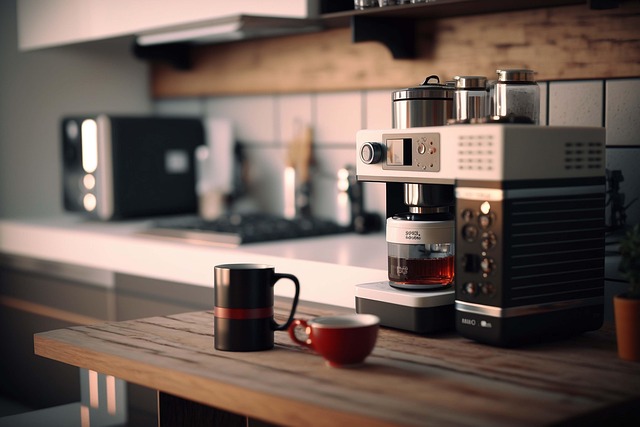When remodeling your kitchen, prioritize sustainable kitchen design by choosing eco-friendly materials like bamboo countertops, recycled glass, and second-hand fixtures to reduce waste and energy consumption. Opt for Energy Star-rated appliances and LED lighting to minimize utility bills and environmental impact. These choices contribute to a more sustainable future while offering unique, high-quality designs.
Looking to update your kitchen while minimizing environmental impact? Discover ethical and low-impact choices for a sustainable kitchen design. From eco-friendly materials like recycled countertops and upcycled cabinets, to energy-efficient appliances and waste reduction strategies, we explore practical ways to transform your space. Learn how to choose long-lasting, versatile fixtures, reduce plastic waste, and create a functional kitchen that supports both your lifestyle and the planet.
- Choosing Eco-Friendly Materials
- – Exploring sustainable alternatives for kitchen countertops, cabinets, and flooring.
- – Benefits of using recycled, upcycled, and natural materials.
- Energy-Efficient Appliances and Fixtures
Choosing Eco-Friendly Materials
When updating your kitchen, one key aspect of an ethical and low-impact transformation is selecting eco-friendly materials. Opting for sustainable kitchen design involves choosing products that minimize environmental harm and promote recycling or upcycling wherever possible. For instance, consider bamboo or recycled glass countertops, which offer durability and a unique aesthetic while reducing waste and the carbon footprint associated with traditional materials.
Additionally, look for appliances with Energy Star ratings, as they consume less energy, helping to lower your utility bills and reduce greenhouse gas emissions. Incorporating second-hand or vintage fixtures and hardware can also be an excellent way to give your kitchen a unique, personalized touch while avoiding the environmental impact of new manufacturing processes.
– Exploring sustainable alternatives for kitchen countertops, cabinets, and flooring.
When designing a sustainable kitchen, one often overlooked yet significant aspect is choosing eco-friendly materials for countertops, cabinets, and flooring. The market now offers a plethora of options that are not only aesthetically pleasing but also environmentally responsible. For instance, many opt for recycled glass or plastic countertops, which reduce the need for new resource extraction while providing unique, visually appealing finishes.
In terms of cabinets and flooring, solid wood from sustainably managed forests is an excellent choice, known for its durability and ability to be recycled or reused. Alternatively, bamboo—a fast-growing grass—is gaining popularity as a sustainable flooring option due to its strength and similarity in appearance to hardwood. These choices contribute to a greener kitchen while ensuring long-lasting, quality finishes that enhance the overall design aesthetic of sustainable kitchen design.
– Benefits of using recycled, upcycled, and natural materials.
Adopting recycled, upcycled, and natural materials for kitchen updates offers a plethora of benefits aligned with sustainable kitchen design. These choices not only reduce environmental impact but also contribute to a healthier living space. Natural materials like wood, stone, and bamboo are renewable resources that have a lower carbon footprint compared to conventional alternatives. They also add warmth and character to your kitchen, creating an aesthetically pleasing environment.
Moreover, using recycled and upcycled materials diverts waste from landfills, conserving precious resources and energy. From reclaimed wood to repurposed furniture, these options provide unique, one-of-a-kind pieces that reflect individual style while minimizing the demand for new material production. Such practices are in line with the growing trend towards eco-conscious living, ensuring a more sustainable future for our planet.
Energy-Efficient Appliances and Fixtures
In the pursuit of a sustainable kitchen design, one of the most impactful changes is upgrading to energy-efficient appliances and fixtures. Modern technology offers a range of options that significantly reduce power consumption without compromising performance. For instance, LED lighting is not only bright but also highly efficient, using up to 80% less energy than traditional incandescent bulbs while lasting ten times longer. Similarly, energy-star rated refrigerators, dishwashers, and washing machines consume less electricity and water, translating to lower utility bills and a smaller carbon footprint.
These updates extend beyond individual appliances to include smart thermostats that optimize heating and cooling systems, ensuring your kitchen remains at the desired temperature with minimal energy waste. Additionally, using efficient flow-regulating faucets and low-pressure showerheads in your kitchen can cut water usage by up to 50% without sacrificing comfort or hygiene. By integrating these measures, you not only contribute to environmental conservation but also create a more economical and eco-friendly kitchen space.
In embracing a sustainable kitchen design, we can transform our spaces while minimizing environmental impact. By selecting eco-friendly materials and energy-efficient appliances, we contribute to a greener planet without compromising style or functionality. These ethical updates not only reduce waste but also create healthy living environments. Let these ideas inspire you to make conscious choices in your kitchen renovation, knowing that every small step towards sustainability makes a big difference.
